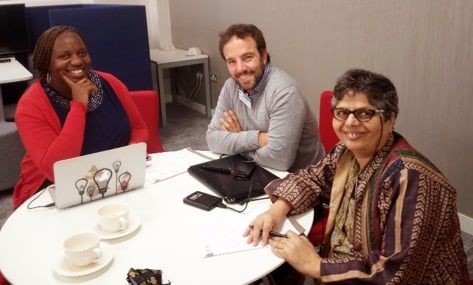In the fall of 2016, Enrique Mendizabal asked me to join the OTT team as the South Asian Editor at Large. It has been almost three years since I met Enrique and I started following OTT. In my professional capacity, I had contributed a couple of articles, but never imagined that I would be a part of this team. Apart from being surprised, I felt honoured to be a part of this initiative.
Once the excitement abated, I put on my thinking cap and asked myself, what am I supposed to do as an editor? Will I live up to the expectations? How can I use my skills? I was sure about a couple of things: I would meet interesting people and learn new ways to enhance my existing skills.
The first Skype chat with my counterparts, Ruthpearl Ng’ang’a, Editor at Large (Africa) and Leandro Echt, Editor at Large (Latin America), helped ease my nervousness. I knew both of them from earlier instances; I met Ruthpearl at Istanbul at a TTI meeting, and had been corresponding with Leandro for the Politics & Ideas platform. As a team, we had a serious, yet friendly, and cordial approach to our editorial roles. During our conversation, we came up with ideas and tentative activities:
- Analyse the existing and upcoming interviews of Executive Directors;
- Identify emerging patterns;
- Based on our analyses, publish a report or article at the end of the year;
- Encourage and invite researchers from these regions to write articles; and
- Cross post articles based on the topical issues in the regions.
After this conversation, we agreed to think about what we had discussed and come up with some concrete outputs. In the meantime, we were asked to make a presentation at the OTT Conference in February 2017 in London.
The conference gave us the opportunity to broaden our thoughts. We agreed to put forth some of the key points we had previously discussed and ask for suggestions from the larger group. For the presentation, we asked ourselves a set of questions and drafted probable solutions and answers. We then presented these questions to the group, hoping to get new insights and different points of view. Here are some of the key points from the presentation:
Why is an OTT regional aspect necessary?
- Traditionally, think tanks model themselves based on the regional influence to include political cultures and institutional arrangements. We felt that the regional context has a strong influence in a think tank’s origin, development, features, performance and also in what is included (or not) within the category.
- Primarily, every region has its own set of challenges and opportunities. Think tanks are at different levels of growth in the regions and also come from a different approach or culture of engagement between politics, civil society and academia.
- Finally, support from donors is organised regionally.
Based on the above, we debated on what our goals should be:
- Identify commonalities and differences between the environment and processes of think tanks in Latin America, South Asia and Sub-Saharan Africa.
- Generate relevant content on the challenges and opportunities think tanks face in these three regions.
- Help think tanks in these regions build connections.
- Provide information regarding regional trends.
With more clarity on our goals as regional editors, we chalked out some ideas for 2017:
- Interview Executive Directors of think tanks from these regions.
- Conduct interviews of Board Members and researchers.
- Write an article on think tank management with lessons gathered from interviews with members of support (admin, finance, HR etc.) and the communications team.
- Conduct short interviews on cross-regional hot policy topics (i.e.: education, climate change, SDGs, etc.).
- Invite think tankers and researchers to write about hot policy topics from a regional perspective.
- Conduct webinars on cross-regional policy topics.

The conference gave us an opportunity to work together and develop the points above, including planning and scheduling some of the activities. We have committed to the following activities for 2017:
Interviews:
- Create a question bank for the interviews
- Interview six EDS
Webinars:
- Identify and agree on webinar hot topics
- Identify three experts for each topic from each region
- Schedule three webinars
Publications:
- Invite researchers to contribute articles
- Cross post interesting and topical articles
- Co-author articles amongst us (focusing on the communications aspect)

